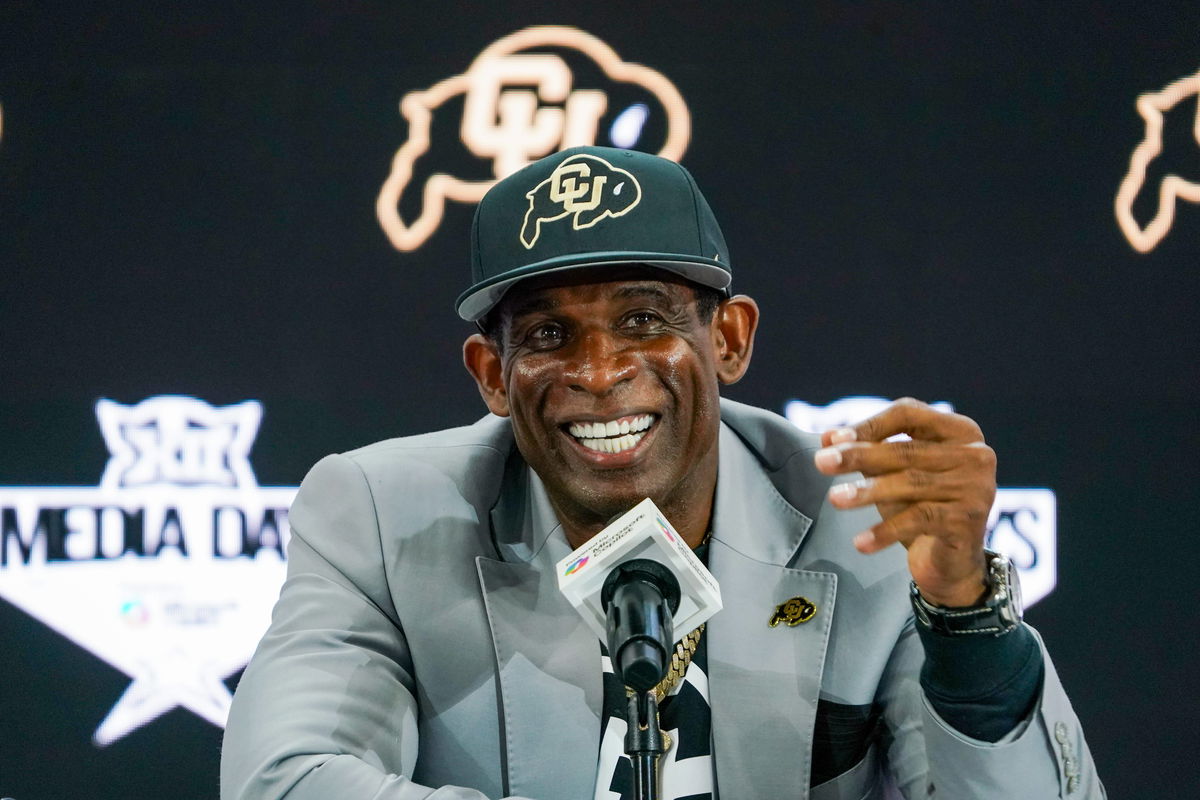
Imago
NCAA, College League, USA Football: Big 12 Media Days Jul 9, 2025 Frisco, TX, USA Colorado head coach Deion Sanders speaks with the media during 2025 Big 12 Football Media Days at The Star. Frisco The Star TX USA, EDITORIAL USE ONLY PUBLICATIONxINxGERxSUIxAUTxONLY Copyright: xRaymondxCarlinxIIIx 20250709_rtc_cb2_3431

Imago
NCAA, College League, USA Football: Big 12 Media Days Jul 9, 2025 Frisco, TX, USA Colorado head coach Deion Sanders speaks with the media during 2025 Big 12 Football Media Days at The Star. Frisco The Star TX USA, EDITORIAL USE ONLY PUBLICATIONxINxGERxSUIxAUTxONLY Copyright: xRaymondxCarlinxIIIx 20250709_rtc_cb2_3431
Deion Sanders and Bill Belichick are great coaches; that’s one common thing. But as much as we love Prime, he’ll be out in two years if he can’t get it going. Let’s not forget Belichick stated, “though the players have totally bought in and there’s been a lot of progress since our arrival, we are not a good team.” Belichick has also said he needs three to four games to see what he’s really working with. That bluntness sets the table for the real issue at hand: lumping these two coaching transitions into the same bucket makes for lazy storytelling.
Watch What’s Trending Now!
For The Athletic’s Chris Vannini, the differences are glaring. “Deion Sanders and Bill Belichick were never the same kind of coaching situations. Deion was a high school coach and then an FCS college coach before Colorado. He worked his way up and always understood CFB, and he had two elite talents with him.” That’s the part so many miss. Sanders didn’t walk into Boulder without a map. He arrived with Travis Hunter and Shedeur Sanders in tow — two players who could change a roster overnight. Bill Belichick, meanwhile, is walking into Chapel Hill with decades of NFL equity but zero experience in the rhythm of college football recruiting calendars, NIL deal negotiations, or portal churn.
Then there’s the way outsiders are framing Belichick’s transition. On3’s Brett McMurphy tossed out a bizarre jab that went viral more for its punchline than insight: “Weird stat: In history of college football, Super Bowl champion coaches w/24-year old girlfriends have never won any games as a college head coach.” A not-so-subtle reference to Belichick and his girlfriend Jordan Hudson. But it shows how quickly narratives around Belichick will be colored by things other than Xs and Os. Sanders, too, has lived under that microscope, but the attention came from his persona and his ability to make Colorado appointment viewing.
ADVERTISEMENT
Which brings us to the commissioners. ACC commissioner Jim Phillips framed Belichick’s arrival through a lens that matters most to administrators: television. Colorado averaged 3.86 million viewers per game during last year’s regular season, a staggering number for a team that finished 4–8. Phillips told ESPN, “It’s a little like the Deion thing at Colorado. He grabs your attention. It’s made for television.” And that’s the part people get right — both men are magnetic. But there’s a big difference between being TV gold and being equipped to overhaul a roster in real time. Unlike Sanders’ first year, two of North Carolina’s first three games won’t even be on national television. The hype machine, at least at first, won’t be spinning at the same clip.
Deion Sanders and Bill Belichick were never the same kind of coaching situations.
Deion was a high school coach and then an FCS college coach before Colorado. He worked his way up and always understood CFB, and he had two elite talents with him.
— Chris Vannini (@ChrisVannini) September 2, 2025
Belichick’s model, for now, is closer to a patient rebuild than a reality show. Deion Sanders turned over 70% of his roster via the transfer portal in one offseason. Belichick won’t — and frankly, can’t — operate with that kind of churn. He’s preaching evaluation, saying he needs multiple games just to see what he’s working with. That’s not a hot start, that’s a slow simmer. It’s a system-driven approach, rooted in defense and structure, more NFL-influenced than portal-fueled. The payoff will depend less on the cameras in the stands and more on whether he can translate his schematic genius into a sport that often rewards recruiters more than tacticians.
ADVERTISEMENT
Big 12 commissioner Brett Yormark, on the other hand, is all in on what Sanders is building in Boulder. “I love the direction of the program and what he’s building here, and it’s become very foundational,” Yormark told Sko Buffs Sports. “There’s only one place to go, and that’s up. So I’m very excited about the future.” His words highlight the distinction: Sanders isn’t being measured only by wins and losses, but by culture shift and momentum. Belichick will be judged almost exclusively by whether his NFL pedigree translates into actual victories, not just viewership spikes.
The odd coincidence is that both men, in very different ways, are carrying the same weight: attention. One has turned CU into a circus tent that still sells out even when the lion stumbles. The other has injected new juice into a basketball-first school that suddenly finds itself on the national stage in August headlines.
ADVERTISEMENT
NFL DNA runs deep in Deion Sanders and Belichick’s college blueprints
One area where the parallels between Deion Sanders and Bill Belichick actually do make sense is in the way both men have tapped into their NFL Rolodex to shape their college programs. Both coaches know the value of credibility, and nothing screams legitimacy to a recruit more than a staff filled with names they grew up watching on Sundays.
In Colorado, Sanders has gone all-in on that professional shine. Alongside him, the Buffs boast two more Pro Football Hall of Famers in pass rush coordinator Warren Sapp and running backs coach Marshall Faulk. Add in several assistants with NFL playing or coaching backgrounds, and the program practically runs like a pro outfit disguised as a college team. Sanders has leaned on this to pitch not just development, but a “straight-line to Sundays” mentality that resonates with blue-chip talent.
ADVERTISEMENT
Belichick, on the other hand, has taken a different angle while staying within the same orbit. His UNC program might not be littered with Hall of Fame names, but it’s dripping with NFL structure. From day one, Belichick branded the Tar Heels as “the 33rd NFL team,” setting a tone that development here would be indistinguishable from the pros. That vision is reinforced by a staff that includes former Patriots nutritionist Josh Grimes, longtime strength coach Moses Cabrera, and even personnel input from North Carolina GM Mike Lombardi. And in a strange twist, Cabrera’s story ties the two together—he once served as an assistant strength coach at Colorado back in 2010 under Dan Hawkins.
Top Stories
Scottie Scheffler Injures Fan in the Head at American Express as Painful Moment Is Caught on Camera

‘Hideous’: Jason Day Sparks Outrage With Outfit Choice at PGA Tour Season Debut

Greg Biffle’s House Burglary Suspect Identified After Officials Release Security Camera Footage – Report

Scottie Scheffler Wastes No Time in Breaking Tiger Woods Record Following PGA Tour Season Debut

John Harbaugh Fires Giants Coach Battling Cancer as Ravens Block Staff Poaching

Josh Allen’s Strong Stance on Sean McDermott’s Exit Revealed After Owner Shared Bills QB’s Role in HC’s Firing

ADVERTISEMENT
ADVERTISEMENT
ADVERTISEMENT



